Grinding Your Teeth? What’s The Solution?

It’s fascinating how our minds and bodies are connected, sometimes in seemingly unconscious and uncontrollable ways. One example of this mind-body connection is “tooth grinding or clenching” or what the dental community calls “bruxism.”
Bruxism is simply the clenching of the jaw with enormous amounts of pressure. While normal chewing and tooth function applies between 20-50 pounds of pressure on opposing teeth, bruxism is shown to apply hundreds of pounds of pressure.
A significant and damaging force to oral structures. Bruxism was first noticed in children as they were losing their baby teeth, who would grind their teeth as a result of the discomfort of the process of gaining a permanent dentition.
However, the signs and symptoms of bruxism became apparent in adults also, most common after sleep (although it can happen while awake too).
Signs and symptoms of bruxism are easy to spot:
- Pain and tenderness to the muscles of the jaw
- Ear pain
- Headaches
- Pain to the jaw joint (known as the TMJ – temporomandibular joint)
- Sensitive teeth to hot or cold
- Gum and bone recession
- Sounds of girding during sleep (noticed by your partner)
Not only can bruxism significantly decrease one’s quality of life because of its symptoms, it also does significant damage to oral structures. Due to the enormous amounts of pressure, teeth soon become worn down, losing layers of enamel.
This is usually noticed first by your dentist. This loss of tooth structure can lead to increased susceptibility to cavities, tooth sensitivity to hot/ cold, or the complete cracking of the tooth and failure of crowns and implants.
To add to this, the constant pressure applied to the tooth’s support structures, such as its surrounding ligaments and gums, not only cause pain but undermine the very things that keep teeth strong and stable in the mouth.
What is the solution?
Before any treatment, the cause of bruxism must first be discovered. It is seen that significant cause of daytime and nighttime bruxism is due to stress. To combat daytime bruxism, getting to the root of the problem is often the best method.
Becoming self aware of what triggers your grinding during the day is the first step and finding relaxation methods that work best for you follows. This can include warm compress to the muscles of the jaw, massage therapy, or various stress reduction techniques such as guided meditation.
Night-time bruxism is much more difficult to combat as it occurs in an unconscious manner. This is where your trusty dentist comes in. Creating a custom night-guard made of acrylic, your dentist works with you to reduce to damaging forces on your oral structures during nighttime bruxism.
Through regular monitoring of the problem, your dentist works closely with you to eliminate any of the painful symptoms and eliminate permanent damage to your teeth and support structures.


